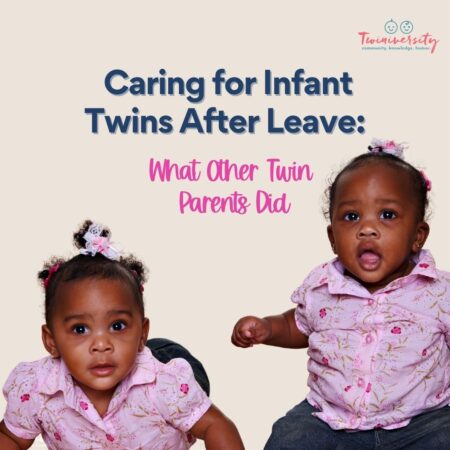Last updated on February 12th, 2024 at 02:58 pm
Did your twins have their own twin language? Are you worried that they aren’t saying enough? Are you worried that their “Twin Talk” will result in a language you won’t understand? Well good news, researchers have found that early stages of “Twin Talk” is nothing to be concerned about. “Twin Talk” or “Twin Speak” is nothing more than then babies mimicking each others babble.
This is their first attempt to verbally communicate with each other and try to be more like mom and dad. Often folks call it “Twin Talk” because it occurs very early on with multiples. Some say it’s a true secret language, others say that it’s just happening because there are two babies in the same stage of language development in your home. You be the judge! Do you think these twinnies were having a real “conversation” about…say…the weather, or snack time, or were they simply mimicking the noises the other was making?
Some Tips on Getting Your Twinnies to Communicate With You Are:
Practice Makes Perfect
Have conversations with your young kiddos. There is no need for “baby talk” all the time. Speak to your children in your regular voice and describe everyday things. If they are sitting in bouncy seats or playing on the floor, explain what you are doing step by step. Pretend you are the host of a cooking show and teach them how to make french toast. Maybe this will stick in their noggins and you’ll have gourmet chefs on your hands when they get older!
Reading Time Is More Important Then You Know
Not only does it soothe your child when they hear your voice, but being able to follow along in a book will help them with number and letter recognition. This is the building block of reading and writing and you can start as early as you like.
Socialize
Even though getting out your front door can be a challenge with multiples, allowing them to socialize with other kiddos will give them exposure to different sounds, broadening their verbal horizons.
Teach Them the Proper Responses
If you are asking them if they would like some milk, don’t give in when they grunt or nod their head. Encourage them to say “Yes” or “Please” whichever is more appropriate for their age.
Let Them Speak for Themselves
Often times there is a dominant multiple who will become the “spokestwinnie” of the group. Try to avoid this and make sure that each of your kiddos know they have their own voice.
If you are ever worried about a speech delay, here is a quick guideline of your kiddos verbal milestones:
If Your Multiples Are Between 12-24 Months, They Should:
- Combine two simple words “mama up” “dada ball”
- Wave good-bye
- Speak between 20 – 50 words
- Be able to make some animal sounds
- Be able to be understood by some non family members who don’t “speak” to them often.
If Your Multiples Are Between 24-36 Months, They Should:
- Ask simple questions like “why” and “what”
- Speak about 450 words
- Tell you what their name is
- Match 3-4 colors, Identify body parts and combine 3-4 word sentences
- Be able to be understood by most non family members who don’t “speak” to them often.
If Your Multiples Are Between 3-4 Years Old, They Should:
- Speak about 1,000 words
- Name colors, animals, letters and numbers
- They should be able to tell a small story or repete a nursery rhyme
- Be able to follow 2-3 step instructions (pick up your socks and put them in the hamper then sit on the rug)
When to Worry About a Speech Delay?
The Mayo clinic says “Talk to your child’s doctor if your child hasn’t mastered most of the speech and language development milestones for his or her age or you’re concerned about any aspect of your child’s development. Speech delays occur for many reasons, including hearing loss. Depending on the circumstances, your child’s doctor might refer your child to a hearing specialist (audiologist) or a speech and language specialist.”
For More Information Please Check Out These Great Resources:
- Zero to Three– ZERO TO THREE is a national nonprofit organization that informs, trains and supports professionals, policymakers and parents in their efforts to improve the lives of infants and toddlers.
- American Academy of Pediatrics
- American Speech-Language-Hearing Association






